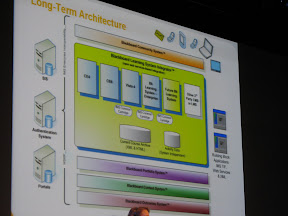I missed Niall Sclater’s closing keynote from the previous report, mainly because I was writing it during his talk (sorry Niall). But it was good, delving into the debate about the role of VLEs in a world of personalised learning. He outlined various possible approaches, such as:
- the “small pieces model”, where a range of distributed web applications meet the student’s needs. There is a problem here with the need for multiple sign-ons which has not yet been solved, and also the problem of having to deal with lots of different interfaces.
- the “docking with the mothership” model, where students’ own “personal learning clients” interact with a central VLE, such as Moodle. Here there may be ongoing problems with interoperability between the various clients and the central system.
- the “PLE server” model, where personal learning facilities are provided centrally for students’ benefit. Elgg and Mahara are examples.
In the process he mentioned the OU’s new “Moodle on a stick” – an offline Moodle that can be synchronised with a central server. This is due to be released soon – by end of 2007 probably.
His conclusions were that none of these setups is yet wholly convincing, and that the VLE still has a place in formal learning. Future PLE clients and e-portfolios will certainly have a role to play, but probably in concert with a VLE.
So, on to day 2 highlights:
Jonathan Fine from OU ran through some applications of MathTran, his system for processing TeX in web pages and serving up the output as images on the fly. There seem to be a lot of these systems knocking about, but this one is very impressive. Jonathan admitted that jsMath is also a very strong rival, and said that where jsMath wins on layout, his system wins on speed.
In the last session of the day, Peter van der Hijden argued that the Moodle “World” was growing out of control and that it needed more structure. His solution is the formation of local Moodle associations, and used the Dutch Ned-Moove group as an example of how such groups can support users and developers. He argued that such groups should encourage personal membership, rather than having institutional representatives, to empower users of Moodle.
Steve







